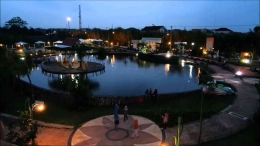Marketing is the most important activity for organizations that offer or sell goods or services. Through these activities the organization makes contact with external parties to sell its products. Kotler and Keller (2016) define marketing as a social and managerial process, by which individuals and groups obtain what they need and want through creating, offering and exchanging products of value with other people or groups.
Marketing can cover a wide range of sectors, including tourism. Zebua (2016) stated, tourism is one of the priority sectors of the Indonesian government's development, because it provides a large multiplier effect in the Indonesian economy. Various other sub-sectors, such as accommodation, transportation, to Micro, small and medium enterprises (MSMEs) also get opportunities from the tourism industry.
The COVID-19 pandemic has had a huge impact on various sectors of the economy. The tourism industry is one of the sectors most affected by the pandemic. Since February 2020 the number of foreign tourists entering Indonesia has decreased very drastically, and the peak occurred in April 2020 with only 158,000 tourists. In total, throughout 2020 the number of foreign tourists entering Indonesia was only around 4.052 million people. only about 25% of the number of tourists who entered Indonesia in 2019. As a result, according to BPS 2020 data, around 409 thousand workers in the tourism sector lost their jobs due to the Covid-19 pandemic (Kemenparekraf/Baparekraf, 2021).
The Covid-19 pandemic is currently starting to subside. Various economic sectors, including the tourism sector, have begun to revive. Sharma et al (2021), examined the rise of the post-pandemic tourism industry. The results of his research outline four main factors for building the resilience of the tourism industry in times of crisis, namely: government response, technological innovation, a sense of belonging to the local community, and consumer and employee trust. A new economic order characterized by the rise of sustainable tourism, community welfare, climate action, and local community involvement is expected to be developed after the Covid-19 pandemic.
To manage the crisis situation in the tourism industry due to the Covid-19 Pandemic, so far the central, provincial, and city/district governments have tried to work together. Matching funds during emergencies, matching programs during recovery, and matching promotions with joint events, have been tried to accelerate the handling of the crisis phase in the tourism sector. The strategy in the recovery phase towards the normalization phase to rebuilding tourism brand awareness has become strategic and synergistic steps taken by the government (Saraswati & Afifi, 2022).
The Covid-19 pandemic has not hindered efforts to develop the tourism sector. This is found in the efforts of the Banyumas Regency Government to develop various tourist objects in Banyumas Regency, especially the Mas Kemambang Floating Park. The tourist attraction, which was originally named Taman Balai Kemambang, is located in Karangkobar Village, which is an urban area. The location is quite strategic so it is very easy for people to visit it.
The development of the Mas Kemambang Floating Park is expected to build a positive image of the Mas Kemambang Floating Park, for example as an attractive, clean and tidy tourist attraction, having unique rides/facilities, cheap but still of high quality, and so on. This is very important to support the marketing of Taman Apung Mas Kemambang in the long term. The more positive the image that is built, the higher the chance of repeat visits by tourists.
This study aims to assess the impact of the development of the Mas Kemambang Floating Park. The impact studied is focused on the image of the Mas Kemambang Floating Park and the potential for repeat visits by tourists.
LITERATURE REVIEW
The tourism sector has a strategic role in national development to support the improvement of people's welfare. Law Number 10 of 2009 concerning Tourism states that the implementation of tourism is aimed at increasing national income, expanding and equalizing business opportunities and employment opportunities, encouraging regional development, introducing and utilizing tourist attractions and destinations in Indonesia, and fostering a sense of love for the homeland. and strengthen international friendship. Development in the tourism sector plays an important role in increasing people's income and welfare.







